Related Research Articles

Funk is a music genre that originated in African American communities in the mid-1960s when musicians created a rhythmic, danceable new form of music through a mixture of various music genres that were popular among African-Americans in the mid-20th century. It deemphasizes melody and chord progressions and focuses on a strong rhythmic groove of a bassline played by an electric bassist and a drum part played by a percussionist, often at slower tempos than other popular music. Funk typically consists of a complex percussive groove with rhythm instruments playing interlocking grooves that create a "hypnotic" and "danceable" feel. It uses the same richly colored extended chords found in bebop jazz, such as minor chords with added sevenths and elevenths, and dominant seventh chords with altered ninths and thirteenths.
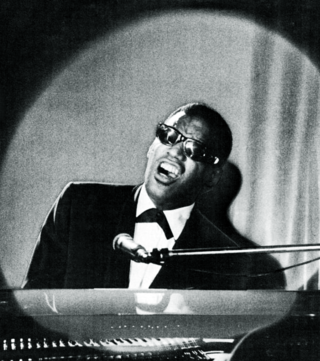
Soul music is a popular music genre that originated in the African American community throughout the United States in the late 1950s and early 1960s. It has its roots in African-American gospel music and rhythm and blues. Soul music became popular for dancing and listening, where U.S. record labels such as Motown, Atlantic and Stax were influential during the Civil Rights Movement. Soul also became popular around the world, directly influencing rock music and the music of Africa. It also had a resurgence in the mid-to late 1990s with the subgenre neo-soul, which added modern production elements and influence from hip-hop.
West Coast hip hop is a regional genre of hip hop music that encompasses any artists or music that originated in the West Coast of the United States. West Coast hip hop began to dominate from a radio play and sales standpoint during the early to-mid 1990s with the birth of G-funk and the emergence of record labels such as Suge Knight and Dr. Dre's Death Row Records, Ice Cube's Lench Mob Records, the continued success of Eazy-E's Ruthless Records, Dr. Dre's Aftermath Entertainment, and others.
Neo soul is a genre of popular music. As a term, it was coined by music industry entrepreneur Kedar Massenburg during the late 1990s to market and describe a style of music that emerged from soul and contemporary R&B. Heavily based in soul music, neo soul is distinguished by a less conventional sound than its contemporary R&B counterpart, with incorporated elements ranging from funk, jazz fusion, hip hop, and African music to pop, rock, and electronic music. It has been noted by music writers for its traditional R&B influences, conscious-driven lyrics, and strong female presence.
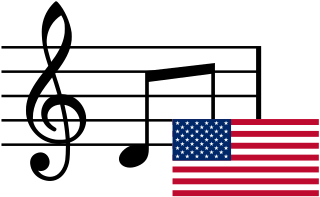
African-American music is a broad term covering a diverse range of musical genres largely developed by African Americans and their culture. Its origins are in musical forms that developed as a result of the enslavement of African Americans prior to the American Civil War. It has been said that "every genre that is born from America has black roots."
Black music is a sound created, produced, or inspired by black people, including African music traditions and African popular music as well as the music genres of the African diaspora, including some Caribbean music, Latin music, Brazilian music and African-American music. These genres include spiritual, gospel, rumba, blues, bomba, rock and roll, rock, jazz,Pop, salsa, R&B, samba, calypso, soca, soul, disco, kwaito,funk, ska, reggae, dub reggae, house, Detroit techno, amapiano, hip hop, pop, gqom, afrobeat, bluegrass, and others.
Popular music of the United Kingdom in the 1980s built on the post-punk and new wave movements, incorporating different sources of inspiration from subgenres and what is now classed as world music in the shape of Jamaican and Indian music. It also explored the consequences of new technology and social change in the electronic music of synthpop. In the early years of the decade, while subgenres like heavy metal music continued to develop separately, there was a considerable crossover between rock and more commercial popular music, with a large number of more "serious" bands, like The Police and UB40, enjoying considerable single chart success.
Electro is a genre of electronic music and early hip hop directly influenced by the use of the Roland TR-808 drum machines and funk. Records in the genre typically feature heavy electronic sounds, usually without vocals, although if vocals are present they are delivered in a deadpan manner, often through electronic distortion such as vocoding and talkboxing. It palpably deviates from its predecessor boogie by being less vocal-oriented and more focused on electronic beats produced by drum machines.
Psychedelic soul is a music genre that emerged in the late 1960s and saw Black soul musicians embrace elements of psychedelic rock, including its production techniques, instrumentation, effects units and drug influences. It came to prominence in the late 1960s and continued into the 1970s, playing a major role in the development of funk and disco.
Top R&B/Hip-Hop Albums is a music chart published weekly by Billboard magazine that ranks R&B and hip hop albums based on sales in the United States and is compiled by Luminate. The chart debuted as Hot R&B LPs in the issue dated January 30, 1965, in an effort by the magazine to further expand into the field of rhythm and blues music. It then went through several name changes, being known as Soul LPs in the 1970s and Top Black Albums in the 1980s, before returning to the R&B identification in 1990 and affixing a hip hop designation in 1999 to reflect the latter's growing sales and relationship to R&B during the decade.

Janelle Monáe Robinson is an American singer, songwriter, rapper and actress. She has received ten Grammy Award nominations, and won a Screen Actors Guild Award and a Children's and Family Emmy Award. Monáe has also been honored with the ASCAP Vanguard Award, as well as the Rising Star Award (2015) and the Trailblazer of the Year Award (2018) from Billboard Women in Music.
Hip-hop or hip hop, also known as rap, and formerly known as disco rap, is a genre of popular music that originated in the early 1970s by African Americans and Caribbean immigrants in the Bronx, a borough of New York City. Hip-hop music originated as an anti-drug and anti-violence genre consisting of stylized rhythmic music that often accompanies rapping, a rhythmic delivery of poetic speech. According to the professor Asante of African American studies at Temple University, "hip hop is something that blacks can unequivocally claim as their own". The music developed as part of the broader hip hop culture, a subculture defined by four key stylistic elements: MCing/rapping, DJing/scratching with turntables, breakdancing, and graffiti art. While often used to refer solely to rapping and rap music, "hip hop" more properly denotes the practice of the entire subculture. The term hip hop music is sometimes used synonymously with the term rap music, though rapping is not a required component of hip hop music; the genre may also incorporate other elements of the culture, including DJing, turntablism, scratching, beatboxing, and instrumental tracks.

The ArchAndroid is the debut studio album by American singer and songwriter Janelle Monáe, released on May 18, 2010, by Wondaland Arts Society, Bad Boy Records, and Atlantic Records. Production for the album took place at Wondaland Studios in Atlanta and was primarily handled by Monáe, Nate "Rocket" Wonder, and Chuck Lightning, with only one song without production by Monáe. She also collaborated for certain songs with Saul Williams, Big Boi, of Montreal, and Deep Cotton.
Future soul is a term often used by UK singer-songwriter Daley in the 2010s to describe a style of music that emerged from soul and contemporary R&B. Although both soulful and conscious, future soul is distinguished from neo soul as it infuses more elements of pop, electronica, dubstep and hip hop instead of jazz and funk. Simply put, future soul is soulful songwriting infused with forward thinking electronic production.
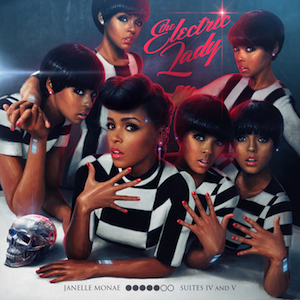
The Electric Lady is the second studio album by American singer and songwriter Janelle Monáe, released on September 6, 2013, by Wondaland Arts Society, Bad Boy Records and Atlantic Records. It is the follow-up to her critically acclaimed debut studio album, The ArchAndroid (2010), and likewise, received universal acclaim from music critics. This album serves as the fourth and fifth installments of her seven-part Metropolis concept series. Musically, The Electric Lady incorporates influences of hip hop soul, funk, gospel, jazz, rock, pop, and reggae.
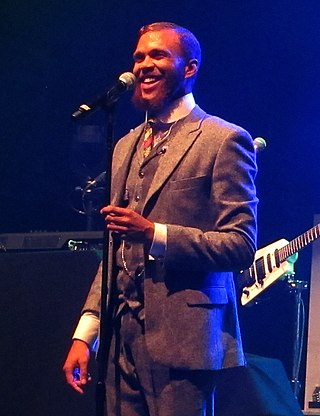
Jidenna Theodore Mobisson, known mononymously as Jidenna, is an American rapper and singer. He signed with Janelle Monáe's record label Wondaland Arts Society, an imprint of Epic Records to release his debut single, "Classic Man" in 2015. The song peaked at number 22 on the Billboard Hot 100, received double platinum certification by the Recording Industry Association of America (RIAA), and was followed up with the single "Yoga" that same year. Both of which preceded the release of Wondaland's debut compilation project, The Eephus (2015). Jidenna's debut studio album, The Chief (2017) peaked at number 38 on the Billboard 200. His second album, 85 to Africa (2019) explored Afrobeats.

"Yoga" is a song by American singer Janelle Monáe and Nigerian-American rapper Jidenna. It was released on March 31, 2015 as the second single from the collective EP, The Eephus. A departure from Monáe's well-known indie funk and psychedelic sound, "Yoga" is a hip hop and trap record with a more mainstream sound and lyrics that can be interpreted as "sexualized". Many music blogs and publications have praised Monáe for her creativity, sense of individuality and boldness on the track as well as Jidenna's relaxed flow. The song was produced by Nate "Rocket" Wonder, Nana Kwabena and Jidenna. In the United States, "Yoga" became Monáe's first single as a lead artist to chart on the Billboard Hot 100; the song, "We Are Young" on which she was featured, peaked at number one in 2012.
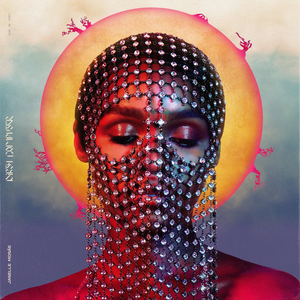
Dirty Computer is the third studio album by American singer and songwriter Janelle Monáe, released on April 27, 2018, by Wondaland Arts Society, Bad Boy Records and Atlantic Records. It is the follow-up to her studio albums The ArchAndroid (2010) and The Electric Lady (2013) and her first album not to continue the Cindi Mayweather Metropolis narrative.
Progressive soul is a type of African-American music that uses a progressive approach, particularly in the context of the soul and funk genres. It developed in the late 1960s and early 1970s through the recordings of innovative black musicians who pushed the structural and stylistic boundaries of those genres. Among their influences were musical forms that arose from rhythm and blues music's transformation into rock, such as Motown, progressive rock, psychedelic soul, and jazz fusion.
References
- ↑ A, Simi (2023-05-11). "R&B, the Essential Guide: evolution, icons, Contemporary R&B / Soul". The Blues Project. Retrieved 2024-01-05.
- ↑ "Artist Spotlight: Olive Louise pours soul, poetry into indie music". Artist Spotlight: Olive Louise pours soul, poetry into indie music - The Post. Retrieved 2024-01-05.
- ↑ Staff, G. G. M. (2023-07-01). "Rising Indie-Soul-Pop Artist AKICITA Unveils Soul-Stirring Second Single "Liquor" from Highly Anticipated Debut EP - Guitar Girl Magazine". Guitar Girl Magazine - Magazine dedicated to encouraging, inspiring, and empowering female and female-identifying guitar and bass players. Retrieved 2024-01-05.
- ↑ "Club Lotus is ready to blur the boundaries of sound". The FADER. Retrieved 2024-01-05.
- ↑ "The Boom Booms bring their indie-soul music to Kelowna". Kelowna Capital News. 2019-01-23. Retrieved 2024-01-05.
- ↑ "The Curmudgeon: Black Bohemian Music from Sly to Prince to Janelle Monáe". Paste Magazine. Retrieved 2024-01-07.
- ↑ Bennett, Samantha (2014-07-16). "Explainer: indie music". The Conversation. Retrieved 2024-01-07.
- ↑ Paese, Meagan. "Soul Music | The History of Rock and Roll Radio Show" . Retrieved 2024-01-07.
- ↑ "A History of Soul Music". www.scaruffi.com. Retrieved 2024-01-07.
- ↑ Manrique, Diego A. (2023-03-20). "Motown's abuse of its artists". EL PAÍS English. Retrieved 2024-01-07.
- ↑ Heron, Tamera (2023-02-05). "Black Music History: How Soul Music artists championed political change". The Blues Project. Retrieved 2024-01-07.
- ↑ "History of Soul Music". Timeline of African American Music. Retrieved 2024-01-07.
- ↑ "The Decline of Soul Music in the 1960s | Ben Vaughn".
- ↑ A, Simi (2023-05-11). "R&B, the Essential Guide: evolution, icons, Contemporary R&B / Soul". The Blues Project. Retrieved 2024-01-08.
- ↑ https://www.studocu.com/en-us/document/indiana-university-bloomington/contemporary-jazz-soul/decline-of-soul-rise-of-funk/29831322
- ↑ "The Decline Of Soul Music In The 1970s | Ben Vaughn". www.benvaughn.com. Retrieved 2024-01-07.
- ↑ Wicks, Nathaniel E. "THERE IS A MESSAGE IN THE MUSIC: AN EXAMINATION OF SOUL MUSIC AS PROTEST DISCOURSE". California State University Dominguez Hills: 26–27.
- ↑ Smith, Christopher. "The Last Mile of The Way: Soul Music and the Civil Rights Movement". Auctus: The Journal of Undergraduate Research and Creative Scholarship: 2–3.
- ↑ Troutt, David. "I Own Therefore I Am: Copyright, Personality, and Soul Music in the Digital Commons". Fordham Intellectual Property, Media and Entertainment Law Journal. 20 (2): 425.
- ↑ "Hip Hop as a Tool of Social Justice". 2017. doi:10.4135/9781506370118.
{{cite journal}}: Cite journal requires|journal=(help) - ↑ "The South Bronx: Where Hip-Hop Was Born | WNYC | New York Public Radio, Podcasts, Live Streaming Radio, News". WNYC. Retrieved 2024-01-08.
- ↑ Neal, Mark (1997). "Sold out on soul: The corporate annexation of black popular music". Popular Music & Society. 21 (3): 133. doi:10.1080/03007769708591682.
- ↑ Troutt, David. "I Own Therefore I Am: Copyright, Personality, and Soul Music in the Digital Commons". Fordham Intellectual Property, Media and Entertainment Law Journal. 20 (2): 428.
- ↑ "Return to Soul: The 1990s Golden Age of R&B". 30 October 2023.
- ↑ Promotions, Streaming (2021-05-27). "The Continuity of Soul Music | GENRE SPOTLIGHT". Medium. Retrieved 2024-01-07.
- ↑ Indie Soul Journeys | PBS , retrieved 2024-01-08
- ↑ Myles, David (2021-02-25). "Eric Roberson Interview: King of Independent Soul, Eric Roberson is still a 'Music Fan First'". Nu Origins Magazine. Retrieved 2024-01-07.
- ↑ "The Uncle Odis Show: Receipts... How Indie Soul Music became a Multi Billion Dollar Genre of Music. on Apple Podcasts". Apple Podcasts. Retrieved 2024-01-05.
- ↑ Lynskey, Dorian (2019-04-13). "Anderson .Paak: 'People are like – Damn! How are you not on crack cocaine right now?'". The Guardian. ISSN 0261-3077 . Retrieved 2024-01-05.
- ↑ "The Free Nationals Feat. Anderson .Paak, Chronixx & India Shawn: Tiny Desk Concert". Vocalo Radio 91.1FM. 2020-04-22. Retrieved 2024-01-05.
- ↑ "WABE Sounds Like ATL Spotlights Jazz & Indie Soul in September". WABE. Retrieved 2024-01-05.
- ↑ "First Listen: Kameron Corvet strips down his Grammy winning song". SoulTracks - Soul Music Biographies, News and Reviews. 2020-10-15. Retrieved 2024-01-05.
- ↑ Osei, Anthony. "Diddy Says He Wasn't a Control Freak with Janelle Monae". Complex. Retrieved 2024-01-05.
- ↑ "Austin band Nané taps into indie-soul sound for NPR Tiny Desk Contest". KCRW. 2020-07-29. Retrieved 2024-01-05.
- ↑ "Every Noise at Once - indie soul". everynoise.com. Retrieved 2024-01-05.
- ↑ H, Amal (2022-03-20). "What is neo soul music artists?". Famuse : #1 Models, Actors, Agencies, Photographers & Talents Booking Platform. Retrieved 2024-01-08.
- ↑ chalkboardchampions.org https://chalkboardchampions.org/singer-conya-doss-this-queen-of-indie-soul-teaches-special-needs-children/ . Retrieved 2024-01-08.
{{cite web}}: Missing or empty|title=(help) - ↑ "Allen Stone: Staying True to His Indie Soul Roots". Yahoo Entertainment. 2014-09-23. Retrieved 2024-01-08.
- ↑ "Indie Soul Icon Teedra Moses Sits Down With Ayana Contreras". Vocalo Radio 91.1FM. 2023-03-31. Retrieved 2024-01-05.
- ↑ "Indie Soul artists, music and albums".
- ↑ "Best R&B Albums of 2016 So Far". Rolling Stone . 24 June 2016.
- ↑ A, Simi (2023-12-16). "SAULT UNCOVERED: all we know about the mystery Indie R&B/Soul collective". The Blues Project. Retrieved 2024-01-05.
- ↑ Streader, Kate (2019-10-14). "Looking back at Saskwatch's indie-soul legacy". Beat Magazine. Retrieved 2024-01-05.
- ↑ "The Answer to Pop's Prim-Princess Problem? Lykke Li". 24 April 2014.
- ↑ Sexton, Paul (2004-04-05). "U.K. Indie Soul Label Snags U.S. R&B Acts". Billboard. Retrieved 2024-01-05.
- ↑ Yates, Kieran (2014-04-03). "Stones Throw Records: the label that changed hip hop". The Guardian. ISSN 0261-3077 . Retrieved 2024-01-05.
- ↑ "Nxworries – The Vogue" . Retrieved 2024-01-05.
- ↑ "Indie Soul Summer Concert Series Kicks off in Norfolk". SoulTracks - Soul Music Biographies, News and Reviews. 2007-06-20. Retrieved 2024-01-05.
- ↑ "Springfield's Indie Soul Festival Is About Music — And What Happens Between Songs". New England Public Media. 2021-08-18. Retrieved 2024-01-05.
- ↑ "Questlove showcases 'Black Woodstock' soul festival in his hit Sundance documentary". Chicago Sun-Times. 2021-01-29. Retrieved 2024-01-05.
- ↑ "Remembering The James Brown Concert That Calmed Boston". GBH. 2018-04-05. Retrieved 2024-01-05.
- ↑ "About Us". Play It Forward Eclectic Soul Tour. Retrieved 2024-01-05.
- ↑ "IRL SXSW triggers post-covid creativity boom: Megan Thee Stallion VR, an indie soul Wind Down, Bandsintown Big Break, big ass Bunny in a big ass dome + a Music Tech Meetup". Hypebot. 2022-03-11. Retrieved 2024-01-05.
- ↑ "Wild Nights: Indie Soul, Rhythm, and Blues". 18 May 2023.
- ↑ "Golden Gate Bandshell Concert- Indie Soul Fest". San Francisco Recreation and Parks, CA. Retrieved 2024-01-05.
- ↑ Admin, Fusicology (2014-02-18). "INDIGOGO: Undeniable - The Story of The Independent Soul Music Movement". Events, Music, News for the Global Soul Community. Retrieved 2024-01-05.
- ↑ "Indie Soul Journeys | WTTW".